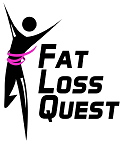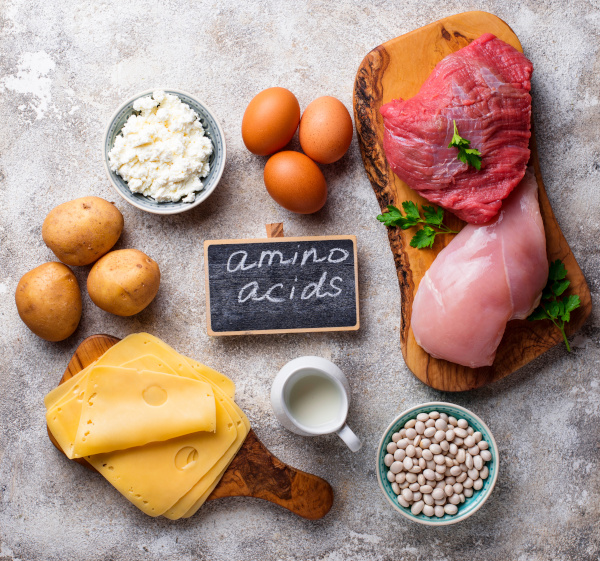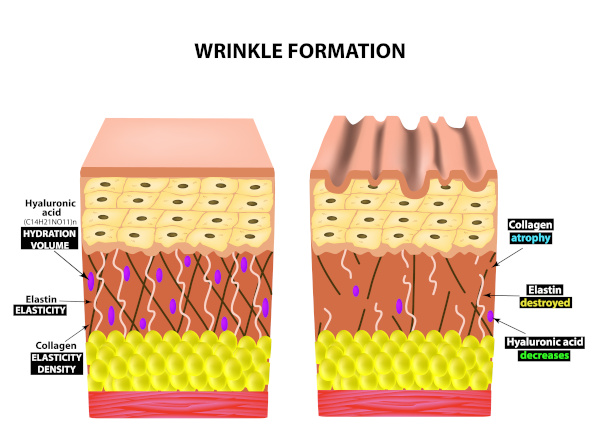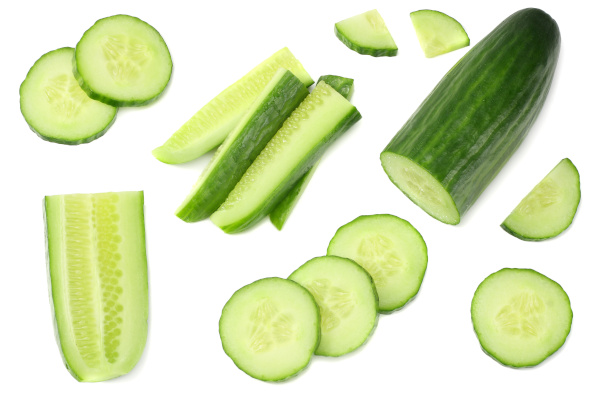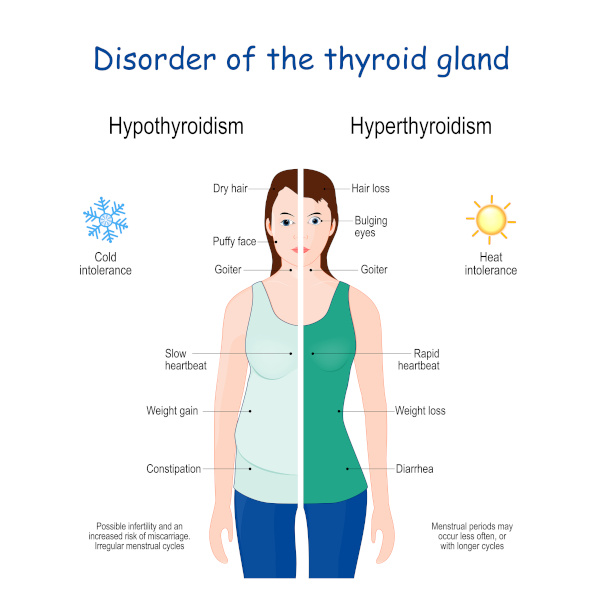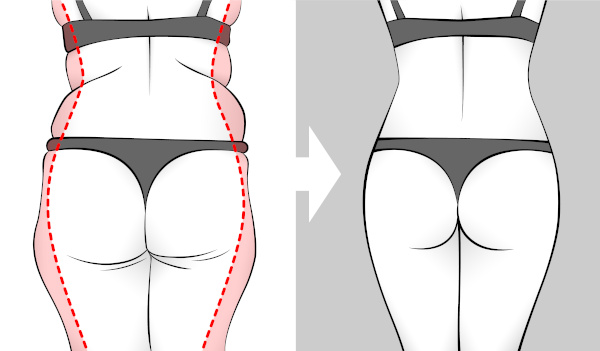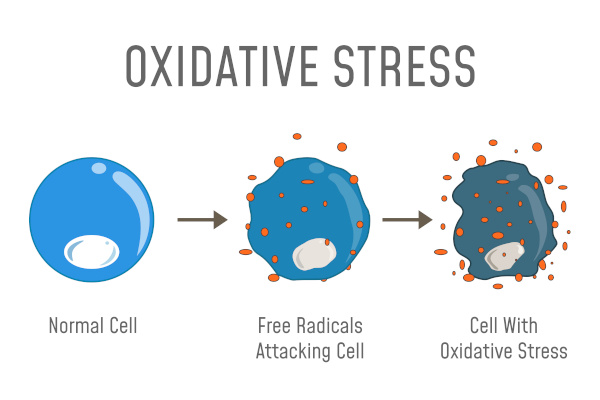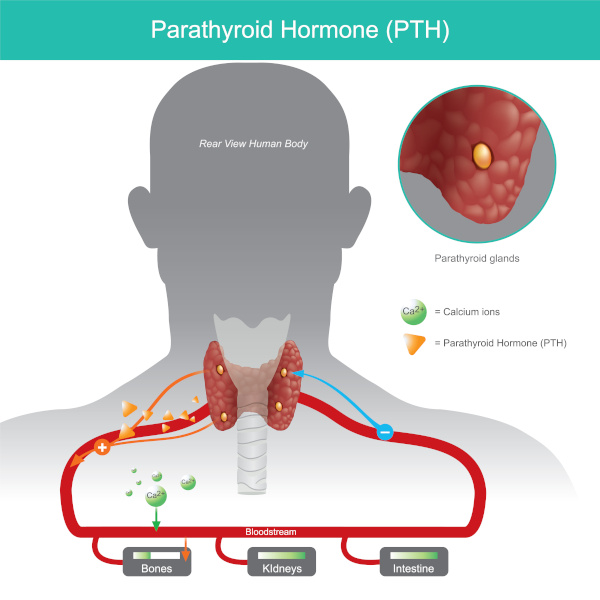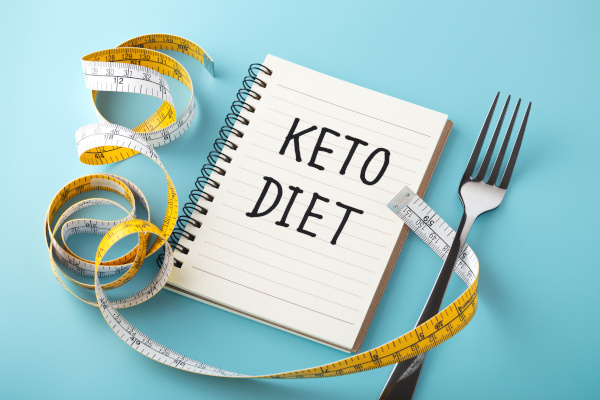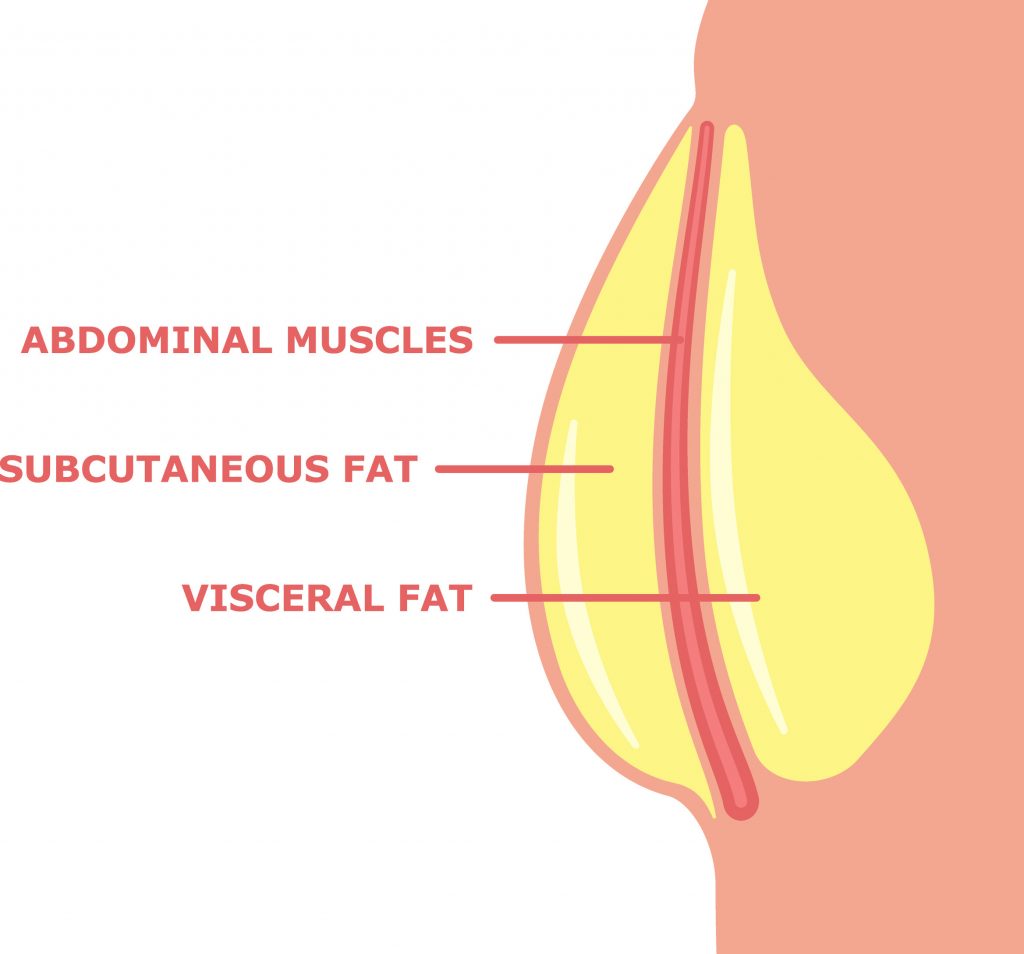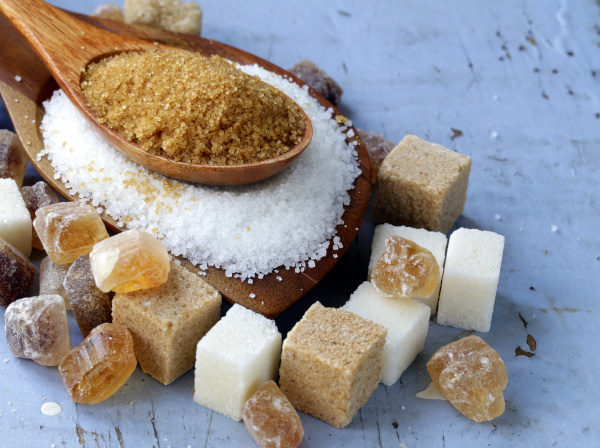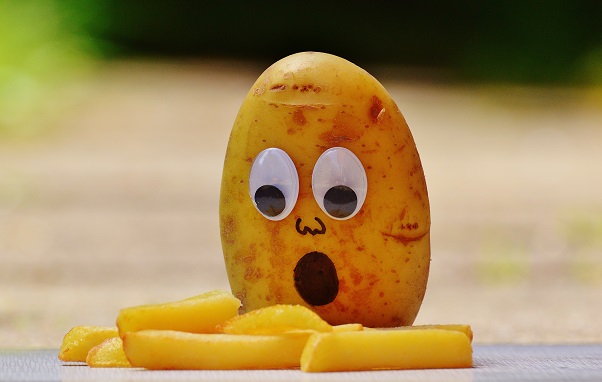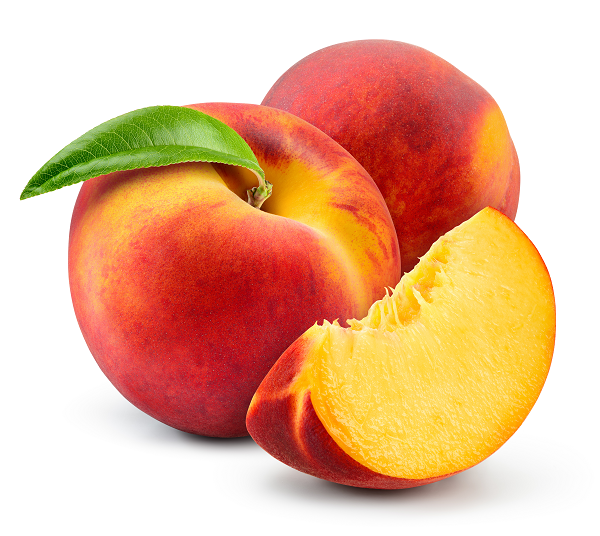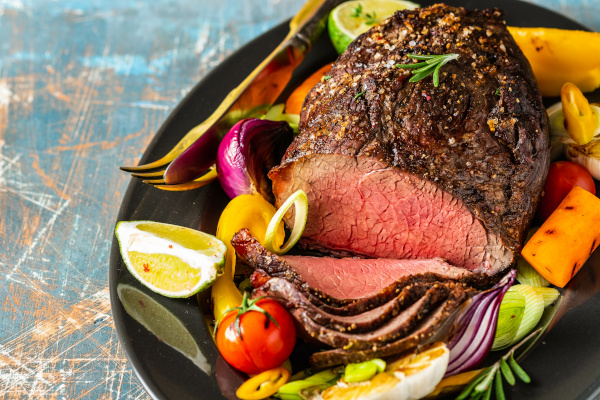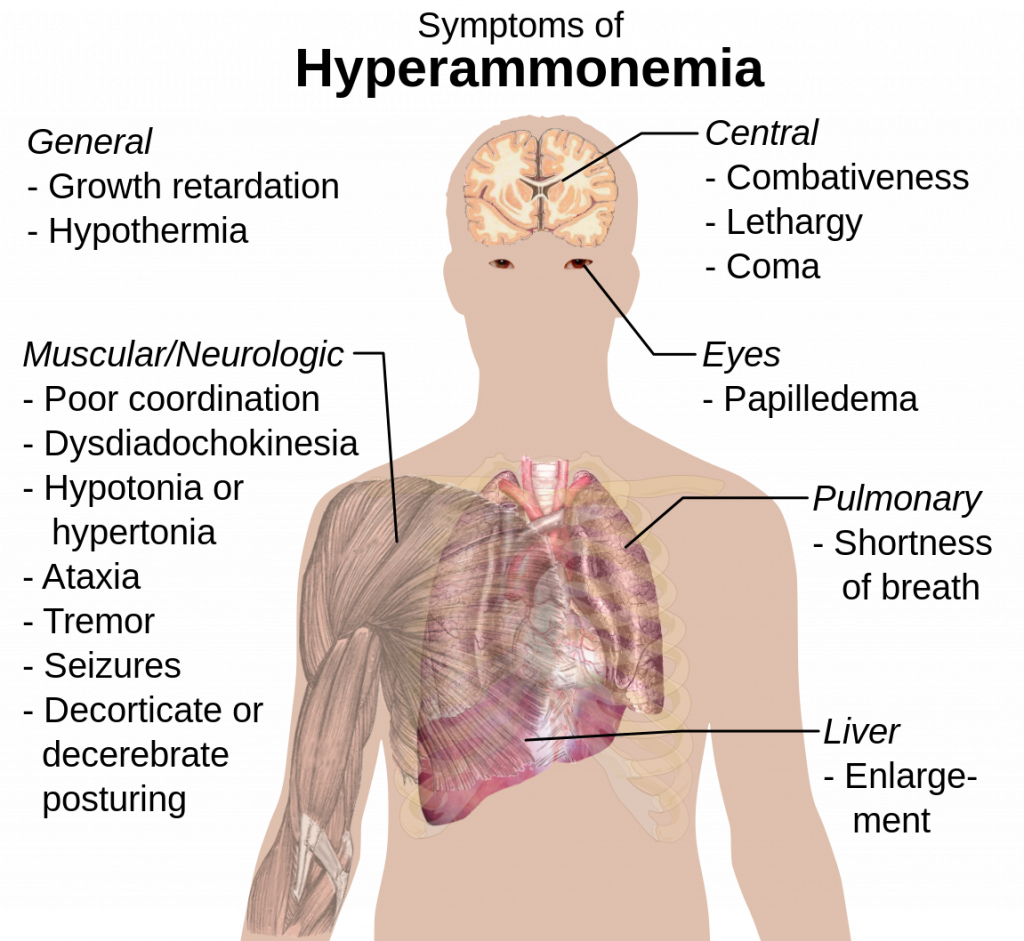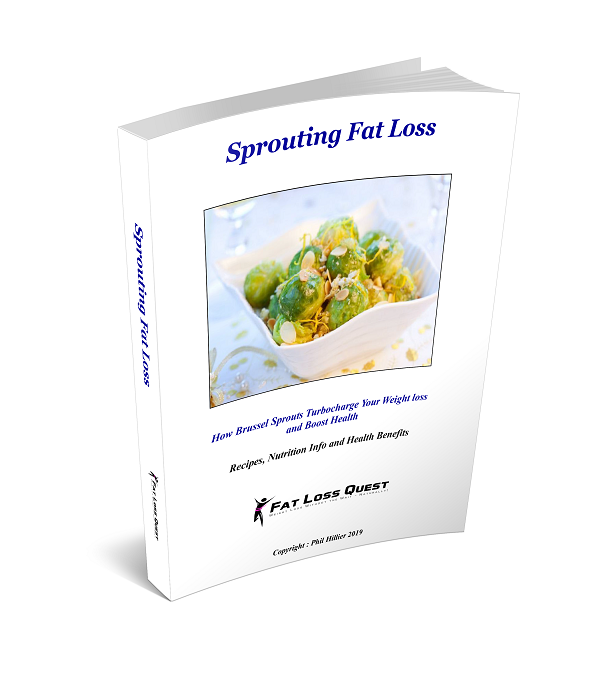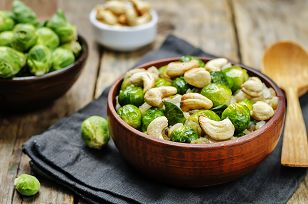Selenium is a powerful mineral that plays a crucial role in maintaining your overall health. Selenium rich foods should be one of your main goals to providing a healthy, balanced diet. From supporting a healthy immune system to promoting thyroid function (to boost your metabolism) and aiding in antioxidant defense, selenium is a nutrient you don’t want to miss out on. Originally, this post was to be the Top 10 Selenium Rich Foods. To help you make the most of this essential mineral, I’ve extended the search and scoured the web to compile a list of the Top 20 selenium rich foods that are wheat free, primarily low-carb and commonly available in a variety of countries (not all sources are widely available), complete with their respective selenium content. Including these delicious options in your diet can lead to a more vibrant and balanced life.
Individual nutritional values may vary. This depends on the geographic location and environmental conditions of the food source and cannot be 100% consistent. Scientific analysis / detection of nutrients in food sources may also have slight variances in the nutritional values.
Additionally, I have categorised the Sources of Selenium into the following groups :
- Nuts and Seeds
- Fish and Shellfish
- Meat
- Additional Sources
Selenium Rich Foods : Nuts and Seeds
1. Brazil Nuts
Brazil nuts are the reigning champions of selenium. Just 1 Brazil Nut provides your recommended daily intake of 55mcg selenium [1]. 100g of Brazil nuts provide 1920mcg Selenium / 100g. This equates to : 3491% Daily Value
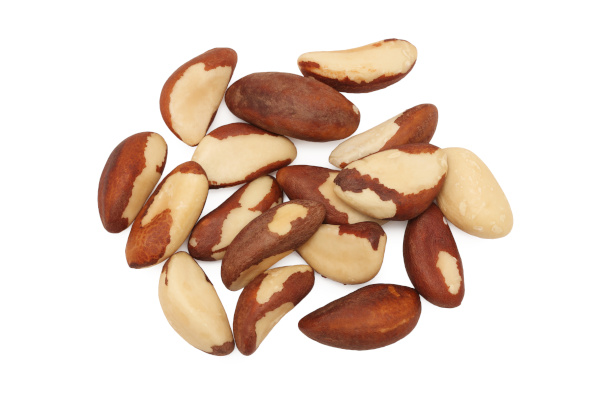
“A small-scale 2014 study looked at the health effects of eating one Brazil nut per day in people with chronic kidney disease. After 3 months, the researchers noticed a reduction
in inflammation and markers of oxidative stress.” [1]
A study in the European Journal of Nutrition reported that eating one Brazil nut per day for 8 weeks lowered total cholesterol and fasting glucose levels in healthy adults.
The findings of another 8-week-long study showed that taking a 200-mcg selenium supplement reduced insulin levels and improved insulin sensitivity in people with type 2 diabetes and coronary heart disease. The researchers also reported increased antioxidant capacity in the body. Enjoy them as a snack or sprinkle them on salads for a delicious and nutritious boost.
2. Sunflower Seeds
Not just delicious, sunflower seeds are also rich in selenium. 1 oz Sunflower seeds provide 32% of the RDI [3]. 100g Sunflower seeds provide 80.4mcg Selenium (146% Daily Value)
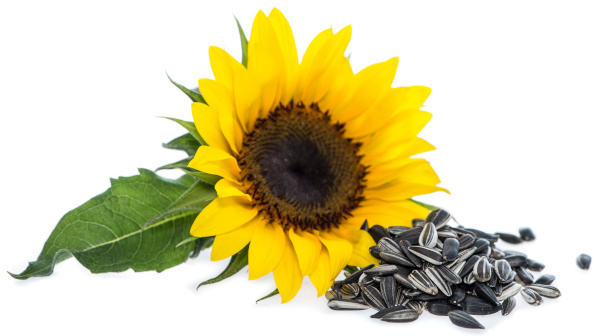
Sunflower seeds are also rich in Vitamin E providing 37% of the RDI. Sunflower seeds also provide [3]:
Zinc: 10% of the RDI (Recommended Daily Intake)
Copper: 26% of the RDI
Manganese: 30% of the RDI
Folate: 17% of the RDI
Pantothenic acid: 20% of the RDI
Additionally, sunflower seeds are a good source of beneficial plant compounds, including phenolic acids and flavonoids — which also function as antioxidants.
Sunflower seeds can be enjoyed as a standalone snack or sprinkle them onto yogurt, in smoothies, or over your morning cereal. Interestingly, when sunflower seeds are sprouted, their plant compounds increase. Sprouting also reduces factors that can interfere with mineral absorption. You can buy sprouted, dried sunflower seeds online or in some stores. [3]
Selenium Rich Foods : Fish and Shellfish
3. Yellowfin Tuna
Yellowfin Tuna is another excellent source of selenium providing approx 92mcg Selenium per 3oz serving. Yellowfin tuna is a valuable addition to any healthy eating / weight loss diet. Its high protein content supports muscle preservation and satiety – crucial for effective weight management. This fish is also rich in omega-3 fatty acids, which aid in metabolic health and reducing inflammation which helps with fat loss. Yellowfin tuna is a source of essential vitamins like B12, (helps boost energy metabolism) and minerals like selenium – beneficial for thyroid function.
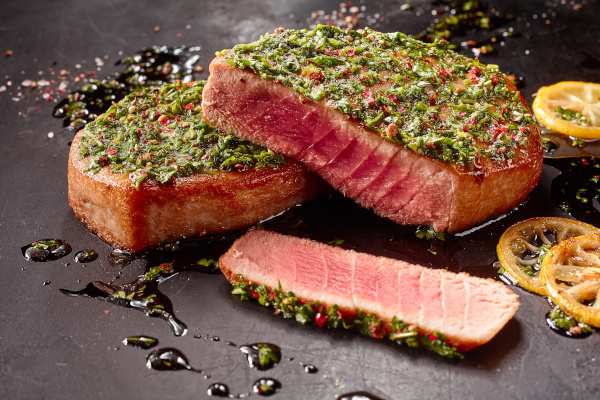
Yellowfin tuna’s selenium content (77 mcg) is 110 percent of the daily value for a 2,000-calorie diet.
Yellowfin tuna also provides 24 percent of the DV for phosphorus — 236 mg and 375 mg of potassium which contributes 11 percent to the recommended daily intake for Potassium [2].
Not only a fantastic protein source, yellowfin tuna is a selenium rich food also brimming with proteins and essential fats. Grill or sear this fish for a delightful addition to your weekly menu.
Yellowfin Tuna is an excellent source of healthy nutrition and can be grilled, fried, served in a salad or with a variety of nutritious low carb vegetables for a very healthy meal. By incorporating yellowfin tuna into a balanced eating plan, you can support your weight loss goals while benefiting from its valuable nutrients.
[Note of Caution : Due to their long lives, Tuna can be higher in levels of Mercury absorbed from the ocean and the fish they eat. Enjoy tuna but be cautious of this Mercury which can cause brain damage.]
4. Mackerel (Atlantic)
Atlantic mackerel is a nutrient-rich fish that offers excellent benefits for health and weight loss. It’s an exceptional source of high-quality protein – essential for
muscle maintenance and preservation. Mackerel can also aid in appetite control, aiding in weight management. Its omega-3 fatty acids, especially EPA and DHA, promote metabolic health and reduce inflammation (one of the primary causes of weight gain). Additionally, mackerel provides crucial vitamins like B12 for energy metabolism and selenium for thyroid function. Incorporating mackerel into a balanced diet can support weight loss goals while providing essential nutrients.
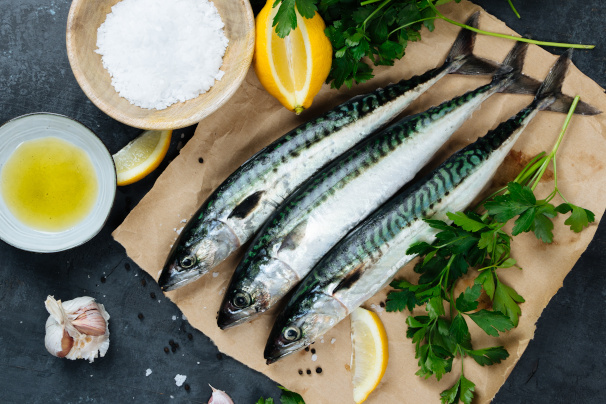
Mackerel (Atlantic) provides 51.6mcg Selenium per 100g [12].
Additionally, Mackerel also provide a wide variety of nutrients including 23.8 g Protein, Og carbohydrate, 401mg Potassium, 97mg Magnesium, 278mg Phosphorous, 18 amino acids and essential fatty acids including Omega 3.
Atlantic Mackerel also provide 18 Amino acids – essential for a variety of physiological processes.
Incorporating mackerel into a balanced diet can support weight loss goals while providing essential nutrients for healthy living and weight management. Mackerel, one of my personal favourites is delicious when simply filleted fresh and pan-fried in butter with a little lemon juice.
5. Herring (Atlantic)
Herring is an excellent source of selenium -1OO-grams of fillet provides 46.8 mcg (85% DV). A 143-gram fillet provides 122% of the daily value of Selenium (supporting thyroid health). Abundant in protein, herring aids in muscle generation and maintenance while also curbing hunger (vital for successful weight management).
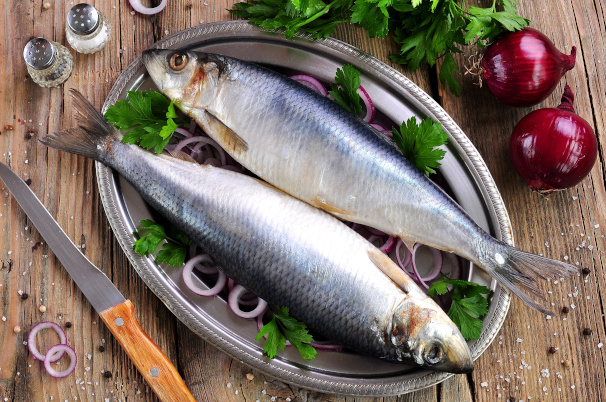
Rich in omega-3 fatty acids, including EPA and DHA, Herring can foster a healthy metabolism and help to reduce inflammation.
Herring also provides essential vitamins like B12, essential for energy metabolism.
While herring is not a personal favourite, herring is a fantastic choice for those seeking weight loss or for weight management. Embracing herring in your well-rounded diet can effectively bolster your overall health while contributing to any weight loss endeavors.
6. Salmon (Atlantic Farmed and Wild)
Atlantic salmon is a nutritional powerhouse, offering an array of health benefits. Rich in high-quality protein, it supports muscle development and aids in satiety, beneficial for weight management. Atlantic Salmon provides 75-85%* DV Selenium depending on source (farmed or wild). Consuming this fish provides a balance of essential proteins, healthy fats, and essential nutrients, making it an exceptional choice for overall well-being.
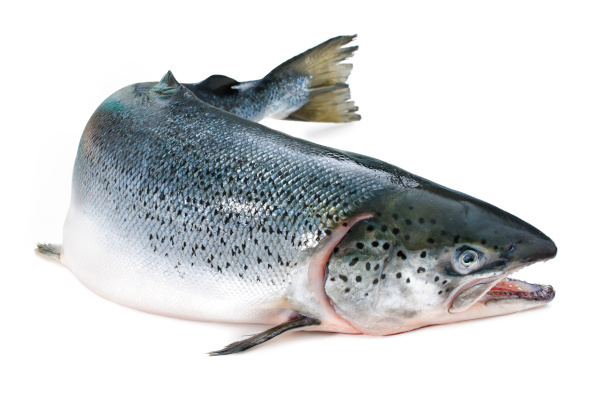
*Farmed Atlantic Salmon provides 41.4 mcg (75% DV) Selenium.
Wild Atlantic Salmon provides 46.8 mcg (85% DV).
The significant omega-3 fatty acid content, particularly EPA and DHA, promotes cardiovascular health, reduces inflammation, and supports brain function.
Salmon is a powerhouse of beneficial nutrition including anti-inflammatories and anti-oxidants like Selenium. Salmon can be enjoyed in many ways – pan fried, smoked and baked to name but a few. Whole salmon cooked and presented on a platter is a delight to see.
7. Swordfish
Swordfish is exceptional for its selenium content providing 68.5 mcg (125% DV) per 100g portion and is a remarkable addition to a healthy diet, offering a variety of health benefits.

In addition to the substantial selenium content, Swordfish is rich in omega-3 fatty acids, specifically, EPA and DHA. Omega-3 fatty acids aid in cardiovascular health, reduce inflammation, and support cognitive function.
Its generous protein content supports muscle growth and appetite control, which is advantageous for weight management. Incorporating swordfish into your diet provides essential proteins, healthy fats, and crucial nutrients, making it a valuable choice for overall wellness. The flesh in swordfish is white, firm and arranged in a circle within the fillet. My first encounter of eating Swordfish was on holiday in Malta. Swordfish is excellent barbecued but equally pan fried in butter.
8. Snapper
Snapper is a valuable inclusion in a balanced diet, presenting an array of health advantages. Snapper also boasts significant selenium levels providing 49 mcg (89% DV) per 100g portion. Selenium rich, Snapper (with its delicious white flaky flesh), could be a pivotal fish in your healthy eating / weight loss endeavours. Its Selenium content is recognised recognized for its antioxidants, bolstering immune function and thyroid well-being.

With its notable protein content, it aids in muscle upkeep and appetite regulation, promoting effective weight management. The considerable presence of omega-3 fatty acids, including EPA and DHA, contributes to heart health, inflammation reduction, and cognitive support.
Integrating snapper into your dietary choices delivers essential proteins, beneficial fats, and vital nutrients, making it a smart choice for overall health enhancement. My first introduction to Snapper was in a Chinese dish with it being steamed whole with a small variety of vegetables.
9. Oysters
Oysters (like them or not) are another superfood rich in a variety of essential vitamins and minerals. A 3.5-ounce (100-gram) serving of cooked wild eastern oysters provides 56% Daily Value for Selenium [6].
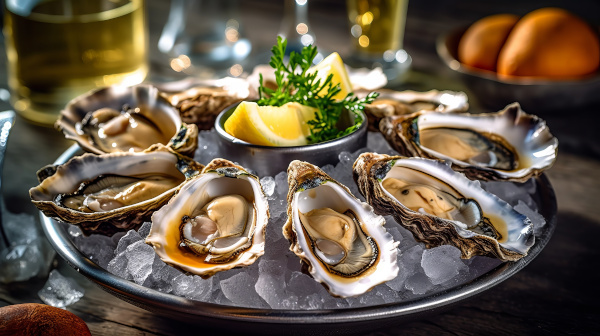
Oysters also provide a MASSIVE 555% of the Daily Value intake of ZINC ( a potent antioxidant), 538% of the DV of Vitamin B12, and 493% of the DV of Copper!
These tasty mollusks are also a good source of omega-3 fatty acids, a family of polyunsaturated fats that play important roles in your body, including regulating inflammation, supporting heart and brain health, and protecting against type 2 diabetes [6].
Not sure about fresh oysters? Smoked Oysters are also available and are delicious – I know! So next time you’re out for a nice meal at the seaside or your favourite seafood restaurant, try sharing a plate of oysters or a seafood platter with Lobster, Languistine, Scallops and Oysters for a true seafood treat bursting in proteins, vital vitamins, minerals and antioxidants!
10. Clams
Clams are a fantastic addition to any healthy eating / weight loss-focused diet due to their low calorie and fat content, making them a great source of high-quality protein. What truly sets them apart is their impressive selenium content – Clams provide 64 mcg (116% DV) Selenium per 100g. Just 3oz (85-gram) serving provides 99% of the daily value of selenium.

With their delicious flavour and dense nutrient profile (including the powerful antioxidant selenium which helps maintain the thyroid and fuel metabolism) clams could be a prime mover for your health and any weight loss endeavours.
Selenium, a vital trace mineral, plays a pivotal role in supporting a healthy metabolism and thyroid function. Furthermore, it acts as a powerful antioxidant, helping to protect cells from oxidative stress.
Incorporating clams into your meals not only provides a delicious and satisfying option but also ensures you’re benefiting from this essential nutrient. Make clams a regular part of your weight loss journey to promote overall health and vitality. Clams can be eaten in a variety of ways. A popular choice for many is Clam Chowder (a rich and hearty white stew made with clams). Alternatively, the can be pan-fried in butter with a little lemon juice or garlic butter.
11. Lobster
Lobster is an excellent choice for individuals focusing on weight loss, as it offers a delectable, low-calorie protein source. This nutrient-packed seafood is not only satisfying but also a great addition to a balanced diet.
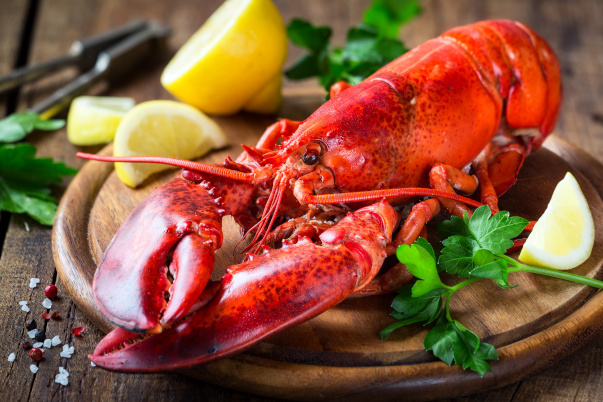
Rich in vital nutrients with that delicious and exotic appearance and delicate flesh, Lobster should form part of your healthy eating diet. Lobster provides numerous essential vitamins and minerals including a Whopping 73.1 mcg (133% DV) per 100g Selenium.
Including lobster in your weight loss plan not only enhances the flavor of your meals but also ensures you’re reaping the benefits of this essential nutrient. Prioritize lobster for a delicious and nutritious approach to weight management.
My personal favourite is the tail – delicious cooked in a variety of meals – steamed, pan fried, or baked (Lobster Thermidor is a delicious dish as is Lobster Mornay, albeit somewhat outdated).
12. Octopus
Surprisingly, Octopus is also rich in selenium (amongst other vital nutrients) and provides 89.6 mcg (163% DV) Selenium per 100g. Octopus is a superb choice for those seeking weight loss, offering a lean and flavorful protein source. It’s a nutrient-rich seafood that’s not only delicious but also highly nutritious.

Just 3oz of Octopus (85-gram) offers 139% of the daily value of Selenium.
Incorporating octopus into your weight loss regimen not only adds variety to your meals but also ensures you’re benefiting from this essential nutrient.
My first try of octopus was on holiday in Malta. I asked the waiter for something local – he offered a pasta bake with tomatoes and a variety of locally sourced seafood. I can honestly say it was delicious! The octopus was soft and delicate – not chewy as I imagined. Pleasantly surprised is an understatement!
As an alternative, try a refreshing octopus salad with mixed greens, cherry tomatoes, red onion, and a zesty vinaigrette for a satisfying and nutritious meal that supports your weight loss goals.
Selenium Rich Foods : Meat
13. Turkey
Turkey, as with most poultry (especially free range / pasture fed) are healthy sources of many nutrients – not just protein. Turkey also provides a healthy dose of 17mcg Selenium per 100g roasted with skin on [4]. Turkey also provides 31.9g protein per 100g serving (roast with skin on). Roast, grill, or include it a fried rice dish or chow-mein for a versatile and nourishing option.

Tip: When roasting any poultry, place in roasting tin resting on the breast fro 30 – 40 minutes. This allows the fats in the back to soften and run down through the meat into the breast with other juices. Rotate the bird onto its back after 45 minutes (30-40% total cooking time) and continue cooking until the juices run colourless form the thickest part of the joint / breast and the skin is brown and crispy. Cooking the bird this way creates a succulent moist breast full of flavour and prevents food poisoning from raw white meat.
Deliciously festive roast turkey with redcurrants and blueberries. A festive favourite that can be enjoyed as a healthy meal with a selection of low carb root vegetables, greens and carrots for a truly healthy meal.
14. Chicken
Chicken is an extremely flexible meat that can be used in a wide variety of dishes including the traditional roast. In 1x 3oz (85g) portion, Chicken provides 36% of the DV of Selenium in addition to the protein, vitamins and other minerals. For the same size portion, Chicken also provides a health boosting 51% of the Daily Value Niacin [7].
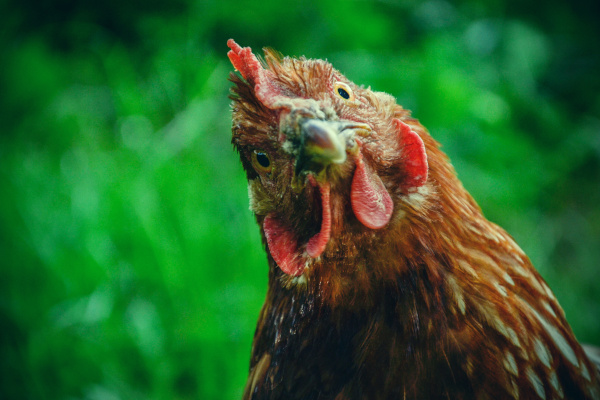
Chicken, a lean and protein-rich meat, is also a selenium rich food. Roast, pan-fry, grill, or add it to soups for a versatile culinary choice.
Chicken is also rich in B vitamins like niacin and vitamins B6 and B12, which play central roles in energy production, DNA synthesis, and brain health [7].
15. Ham
Ham (roast or boiled) is now an excellent meat addition to your healthy eating / weight loss endeavours. Ham used to considered as a “none-lean” source of protein due to the content of saturated fats. However fats have been re-evaluated and are now an essential nutrient for any healthy eating / weight loss diet. Ham also provides a rich source of selenium for thyroid and metabolic health. A three-ounce (85-gram) serving of cooked lean ham leg supplies 77% of the daily value for selenium.

Roast ham can be a valuable addition to a weight loss-focused diet, providing a flavorful and protein-rich choice that’s relatively moderate in calories. This savory meat option offers essential nutrients and versatility in meal preparation. Ham is a great source of proteins and also provides 49.9 mcg (91% DV) Selenium for metabolic health aswell as an immunity boost.
Tip : To incorporate roast ham into your weight loss regimen, explore creative ways to enjoy it, such as roast ham with a fresh salad or fresh vegetables.
16. Pork Chop
Pork chops can be a beneficial inclusion in a weight loss-oriented diet, offering a satisfying and protein-rich option that’s relatively moderate in calories. Pork chops are also rich in Selenium and provide 45.7 mcg (83% DV) Selenium per 100g.
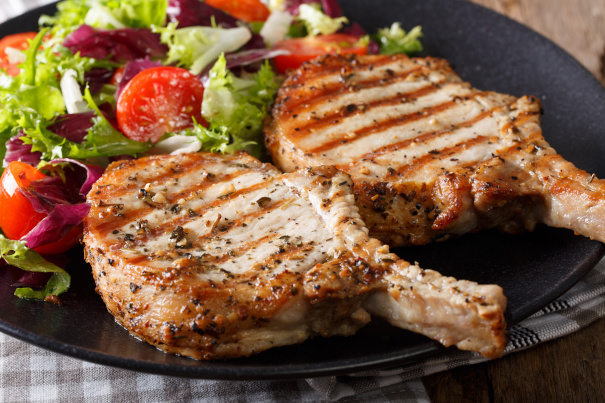
These meat cuts provide essential nutrients while being versatile and flavorful. Pork also introduces saturated fats into your diet that can improve overall health aswell as boost our weight loss endeavours.
These meat cuts provide essential nutrients (esp protein and selenium) while being versatile and flavorful.
Tip : To integrate pork chops into your weight loss plan, consider grilling or baking them with a selection of vibrant vegetables for a balanced and delicious meal. Pork chops can also served as part of a Mixed Grill with steak, lamb chops and eggs (or any other combination you prefer). Best with a low carb side of salad or green vegetables to reduce the overall carb intake.
17. Kidney (Pork)
Pig’s kidneys can be a valuable addition to a weight loss-oriented diet, offering a unique protein source that’s relatively low in calories. Pork Kidneys provide a Massive 312 mcg (567% DV) Selenium.
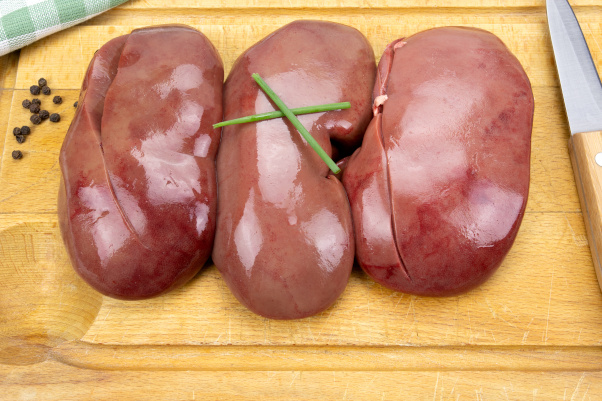
These nutrient-rich organ meats are not only distinctive in flavor but also hold nutritional benefits.
Notably, pig’s kidneys contain selenium, a vital trace mineral that supports metabolic health and thyroid function, playing a key role in overall vitality.
Pigs Kidneys can be enjoyed in a variety of dishes – from grilled, stir fried, added to stews, meatloafs etc.
To include pig’s kidneys in your weight loss journey, try a kidney stir-fry with colorful bell peppers, onions, and a dash of savory seasoning. This meal offers a balanced blend of flavors while providing essential nutrients to support your goals.
18. Liver (Lamb)
Rich in Selenium, Lambs Liver provides 111 mcg (202% DV of Selenium and can be a valuable asset to any healthy eating / weight loss-focused diet, offering a distinctive and nutrient-rich protein source that’s also relatively low in calories.

This organ meat is not only known for its unique flavor but also for its nutritional advantages. Notably, lamb’s liver contains selenium, a crucial trace mineral that supports metabolic health and thyroid function, playing a pivotal role in overall wellness.
TIP : To incorporate lamb’s liver into your weight loss journey, consider preparing a flavorful liver and onions dish with a side of steamed vegetables. This meal provides a flavorful and nutrient-dense option to support your weight loss goals. Alternatively, for a softer, more delicate texture, try stir-frying with spring onions for a couple of minutes. Liver is a great food but can be tough if overcooked – hence my suggestion for a quick stir fry as this dramatically reducing the cooking time and results in a delicious, soft and juicy meat.
19. Eggs
Eggs, a nutritional powerhouse, contain selenium too. While not in the higher leagues of selenium rich foods, eggs are still an important and nutritious source of healthy nutrients. 1 Medium egg contains 12mcg (22% NRV) Selenium [5]. 1 Large egg provides 15mcg Selenium. Scramble, boil, or poach them for a delightful addition to your meals.
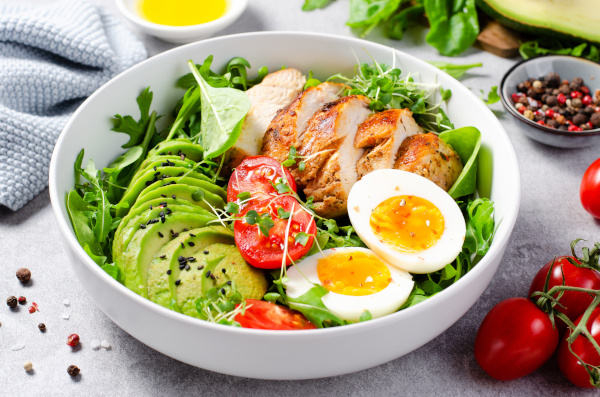
Eggs provide a valuable source of other nutrients too:
Eggs contain 56% NRV for Vitamin B12. Just 2 medium eggs will provide 112% of your Daily Nutritional Value for Vitamin B12. Vitamin B12 boosts the function of Folate (12% from 1 med egg) in cells for energy.
Eggs also provide a valuable source of Biotin (10mcg / 20% NRV) : Biotin contributes to normal energy metabolism and to the maintenance of normal skin, hair, and nervous system function [5].
Scramble, boil, or poach them for a delightful addition to your meals. Alternatively, try a delicious French styled cheese omelette. Delicious and with a gooey centre of molten cheese and soft, lightly cooked egg!!
20. Cottage Cheese (1 cup – 20 mcg)
Cottage cheese is soft, white, and creamy. Cottage cheese is a fresh cheese – it does not undergo an aging or ripening process to develop flavor. While many regard it as “food for old women“, cottage cheese is a very useful addition to the kitchen pantry and your diet. Made from cows milk, Cottage cheese is also offered in different curd sizes, including small, medium, or large, and is available in creamed, whipped, lactose-free, reduced sodium, or sodium-free varieties [8].

Creamy and protein-packed cottage cheese is another dairy option rich in selenium. Enjoy it as a snack, in smoothies, or paired with fresh fruits. Strawberries make an excellent choice to pair with cottage cheese and can even be blended together with a natural Greek yogurt and a dash of vanilla extract for a delicious, summery smoothie!
A half-cup, or 113-gram (g), serving of low fat (1% milk fat) cottage cheese provides 19% Daily Value of Selenium [8] and 29% of the Daily Value (DV) Vitamin B12 [8].
Creamy and protein-packed cottage cheese is a dairy option rich in selenium. Enjoy it as a snack, in smoothies, or paired with fresh fruits.
TIP: Try 4 fresh strawberries with 1 cup of cottage cheese as a delicious and nutritious snack. In a rush? Blend the strawberries and cottage cheese together with~50g Natural Greek Yoghurt and a level teaspoon of Vanilla extract for a quick and delicious healthy smoothie.
Additional Selenium Rich Foods
While the above list represents 20 top sources of selenium, there are additional sources we must also consider. While these may have reduced selenium content, they can provide additional nutrients and so are included in this additional list of selenium rich foods.
Tofu
Tofu is a food prepared by coagulating soy milk and then pressing the resulting curds into solid white blocks of varying softness: silken, soft, firm, extra (or super) firm. Tofu is also known as bean curd in English [11].
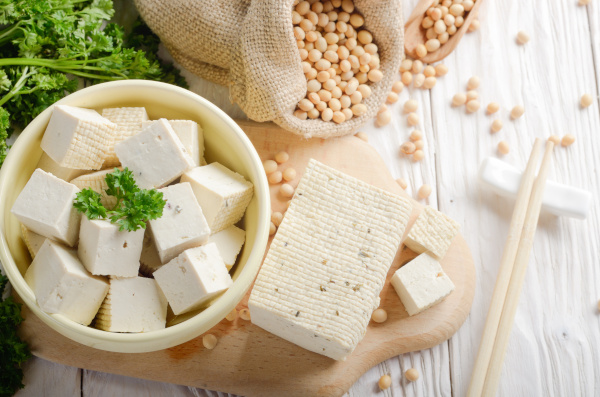
When prepared with calcium sulfate, Tofu provides 17.4 mcg Selenium per 100g equating to 32% DV.
However, while rich in selenium and being vegetarian, Tofu is made with soy milk. Soy milk (as with many soy based products) is not good for weight loss.
Scramble, boil, or poach them for a delightful addition to your meals. Alternatively, try a delicious French styled cheese omelette. Delicious and with a gooey centre of molten cheese and soft, lightly cooked egg!!
Brown Rice (1 cup cooked – 19 mcg)
Whilst many of us are used to seeing and consuming the refined and polished white rice, brown rice is a whole grain. It contains more overall nutrition than its paler counterpart. Due to the varying processes through different manufacturers, the levels of nutrition in brown rice vary more than in other foods. White rice typically provides 14% of the DV Selenium vs 27.3% of the DV for selenium in 1cup of Brown Rice [10].
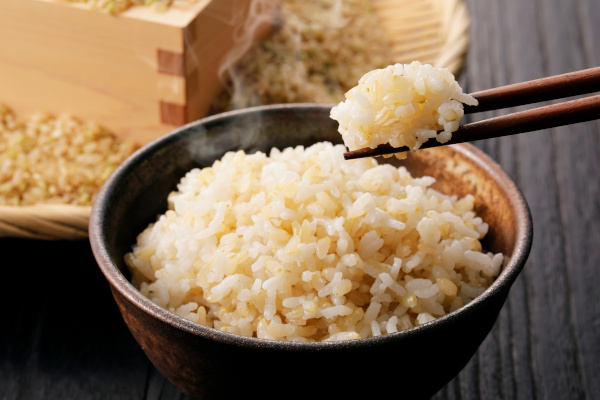
A nutritious whole grain, brown rice is a valuable source of selenium. Use it as a base for stir-fries, salads, or as a side dish to complement your meals.
However, caution needs to be taken as brown rice is also rich in complex carbohydrates. Carbohydrates in all forms contribute to weight gain unless strictly regulated.
“Nuts, seeds, and whole grains like brown rice also contain phytic acid, a substance that can bind to the minerals calcium, iron, and zinc. Some whole grains contain enough phytase, the enzyme required to break down phytic acid, while others like oats, brown rice, and legumes don’t” [9].
Research has also shown phytic acid to have health benefits like antioxidant activity, and cancer and kidney stone prevention, so it’s not necessarily something to completely avoid.
Selenium in Chia Seeds
Chia seeds are a noteworthy inclusion in a weight loss-centered diet, offering a versatile and nutrient-dense option that’s particularly rich in fiber and healthy fats. These tiny seeds provide a feeling of fullness and sustained energy, making them an excellent addition to support weight management. Chia seeds provide 16mcg of selenium per oz, or about 28% for adults [13].
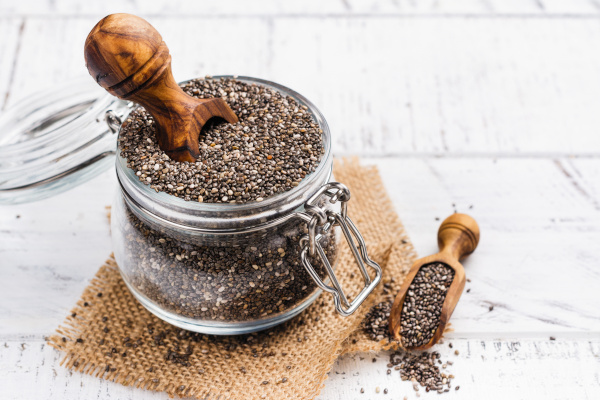
Chia seeds, a healthful alternative to bread, are also a good source of selenium. These tiny powerhouses can be added to smoothies, yogurt, or used as a topping for oatmeal.
To incorporate chia seeds into your weight loss plan, try creating a nutritious chia pudding by soaking them in almond milk overnight and topping with fresh berries. This approach delivers a satisfying and nourishing choice that aligns well with your weight loss objectives.
Shiitake Mushrooms
Incorporating these selenium-rich foods into your daily intake can help you meet your selenium needs, fostering a strong immune system, healthy thyroid function, and overall well-being. Shiitake mushrooms are a popular mushroom variety that offers a good source of selenium providing 65% of the daily value per 145-gram cup serving.

Shiitake Mushrooms can incorporated into many dishes and provide 24.8 mcg (45% DV) per 100g serving for Selenium.
Remember to seek a diverse range of nutrient-dense foods to ensure a balanced diet that covers all essential vitamins and minerals.
Individual selenium requirements may vary based on factors such as age, gender, and activity level. Consult with a registered dietitian or healthcare professional to determine the ideal selenium intake for your specific needs. Relish these delicious foods while prioritizing your health and vitality!
References and Citations
[1] . Medical News Today : Nutrition in Brazil Nuts
[2] Live Strong : Nutrition in Yellowfin Tuna
[3] Healthline : Nutrition in Sunflower Seeds
[4] BBC Good Food : Top 5 Health Benefits of Turkey
[5] Egg Info : Nutrition in Eggs
[6] Healthline : Nutrition in Oysters
[7] Healthline : Nutrition in Chicken
[8] Healthline : Nutrition in Cottage Cheese
[9] Healthline : Nutrition in Brown Rice
[10] Growing Naturals : 11 Reasons Why Brown Rice is Considered a Superfood
[11] Wikipedia : Tofu
